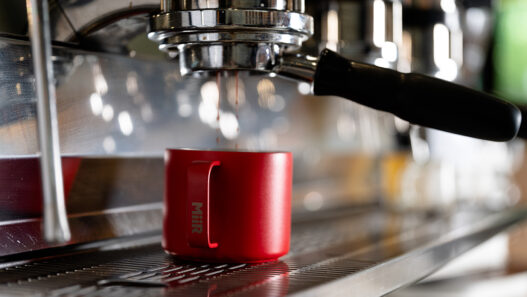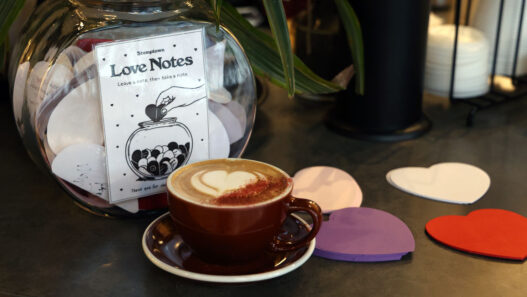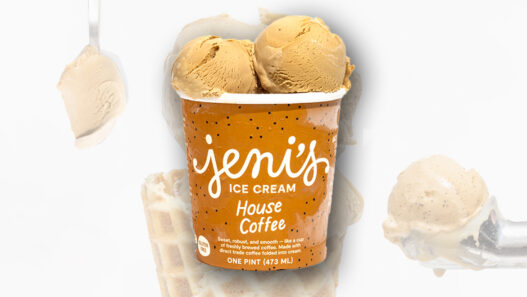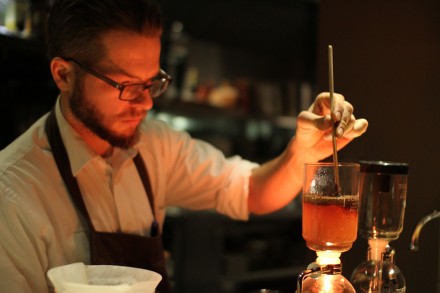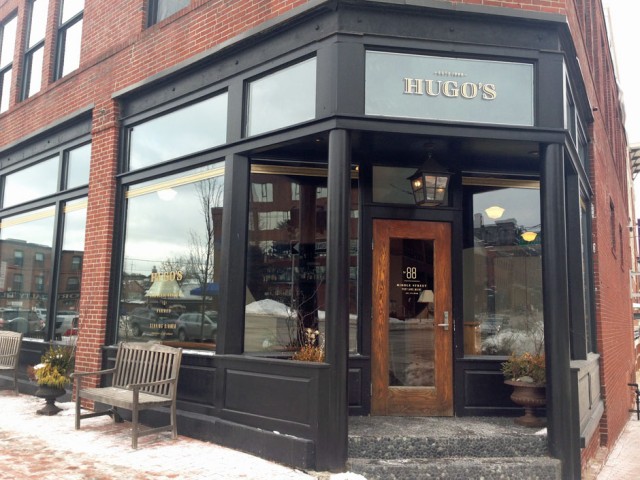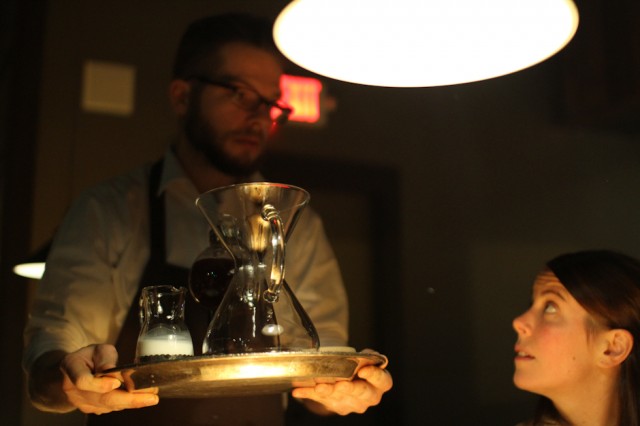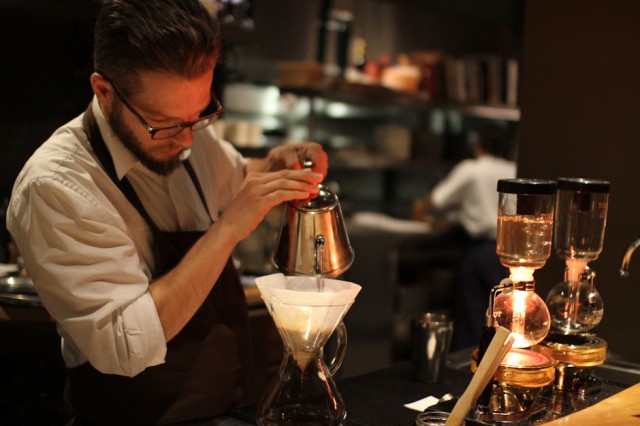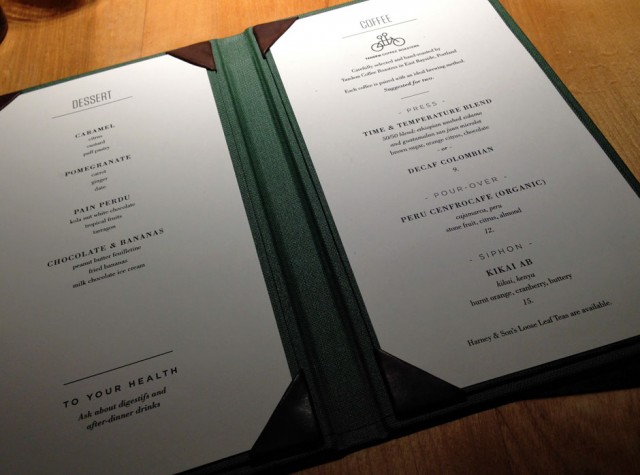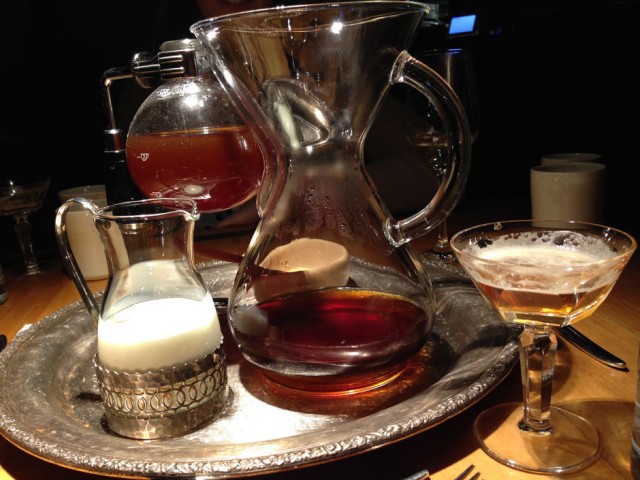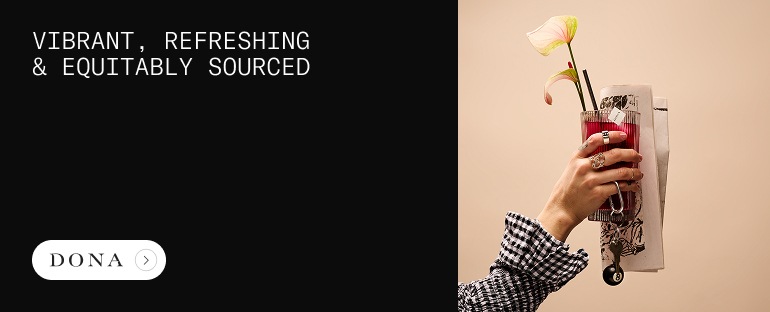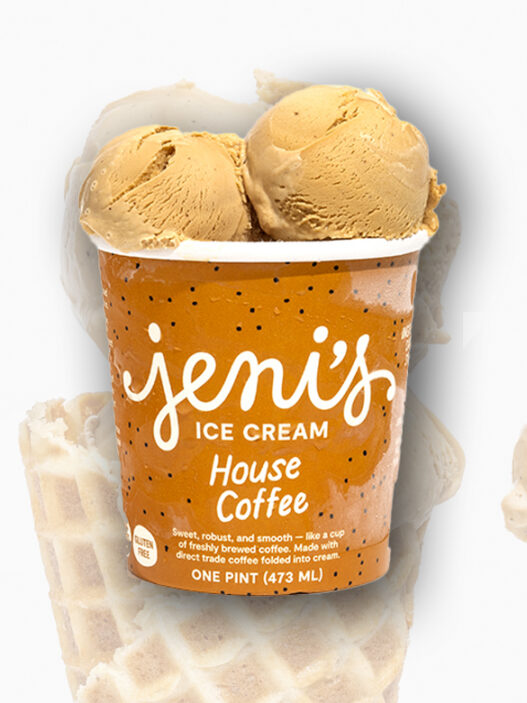It’s a sad refrain heard throughout the coffee world—my exquisite meal was so good, but why was the restaurant’s coffee so bad? While change is filtering slowly throughout the culinary landscape, there’s one town—one exceptionally restauranty town—on the forefront of that change. That town is Portland. Portland, Maine that is.
At Hugo’s, one of the most renowned of this supposedly highest-restaurants-per-capita-than-anywhere-else-in-America city’s establishments, you’ll find one of Portland’s most innovative (and at times intimidating) menus. Enter the handsome East side space, whose decor one might describe as rustic brasserie, with a modern, open kitchen tucked behind the spacious bar, and you’ll be handed a folio of choices from which to chart your course. Tasting menus, with or without wine pairings, are the only options here. Column A, “Foraged & Farmed”. Column B, “From the Sea”. Column C, “Forest & Field”. Mix and match, or play a straight ticket, and you’ll be quick on your way to an intriguing night of seasonal, Atlantic-inspired molecular gastronomy (and a little whimsy, too.)
But what’s most unique here—besides being served an amuse course of a single, roe-topped french fry—is, you guessed it: the coffee. Wish to follow your meal with a seasonally paired coffee brewed for you on Chemex? Or a meticulously made syphon, theatrically prepared at the bar, thermocouple and all? Or simply a cup of delicious French press coffee? In partnership with new-kid-on-the-block Tandem Coffee (our friends and partners here at Sprudge), Hugo’s has transformed the finale of an already transformative dining experience.
Owner/partner Arlin Smith saw Hugo’s coffee service as a way to round out the restaurant’s multi-course adventures. Smith wanted Hugo’s customers to leave feeling, “I got a coffee experience that was thought out and put together with purpose,” he said.
Hugo’s current incarnation, as any Portlander knows, is not its first. The restaurant was first founded in 1988 by Rob Evans and Nancy Pugh. Evans earned a James Beard award in 2009 for “Best Chef in the Northeast” while at Hugo’s, drawing acclaim to the restaurant. When he set his sights across the street, towards creating a smaller, sandwich-and-fries driven eatery called Duckfat, it seemed natural to the restaurant’s then-manager Smith, along with Andrew Taylor and Mike Wylie, already in the kitchen—to keep the esteemed restaurant in the family. Together, the three took over the restaurant, along with the space next door, a recently-vacated culinary bookstore that the group would turn into the bustling Eventide oyster bar—something that could be open all day long at all price points, and help keep the funds flowing for a more ambitious dining program on the other side of the wall (now a shared kitchen) at Hugo’s.
As the new owners began their plans to transform Hugo’s with a four-month renovation in 2013, another trio was working hard to transform something else in town: Portland’s coffee scene. Husband and wife Will and Kathleen Pratt, both formerly of Blue Bottle Coffee, along with Vien Dobui, a former trainer for Blue Bottle, had slowly begun roasting coffee in 2012 in a humble brick building in East Bayside. Tandem Coffee would hardly be Portland’s first artisan roaster: but they were arguably poised to become Portland’s best. Moving away from the more collegiate-style coffeehouses that dotted the local landscape, the Pratts introduced their own take on meticulously roasted and prepared seasonal, carefully sourced coffees to a city they felt was ready to up its cafe game.
“We picked Maine because we wanted to live on the coast, and we wanted to live back in New England, and we’d been hearing so much about the Portland food scene,” said Will Pratt. “It fancies itself as a foodie town. So that made us feel like doing what we wanted to do, that it would be very welcomed. People would be aware.”
The Pratts’ approach to coffee caught Smith and his partners’ attention immediately.
“If you were bouncing around town and you wanted coffee, you’d go to this well-lit crafted coffee bar and you could shoot the shit for an hour with really cool people and watch them roast the coffee and it was very connected to the community,” said Smith.
“We just started drinking their coffee,” said Smith, “And immediately opened the conversation of restaurant coffee. But we started questioning it immediately–we wanted to have grand plans for the new Hugo’s, but we weren’t going to be doing that for a couple of years, so we immediately changed up our drip program [to Tandem].”
And when Hugo’s relaunched last year, the restaurant worked in, uh, tandem with Tandem, to deliver a coffee service on par with the food menu they’d worked so hard to create. Operating now from an open kitchen, it was important to Smith to extend the feel of guest inclusion, performance, and spectacle to the coffee program as well. Rather than relegating coffee service to a station wedged into a hallway, the partners wanted to really show off the goods.
The result? A three-tiered coffee tasting menu with seasonal options selected by Tandem’s roasters, specifically geared to brew on French press, Chemex, or siphon—and prepared by a trained (by veteran trainer Dobui) staff member right at the barside. Haven’t seen a barkeep who knew her way around a siphon and a thermocouple before? Haven’t had your coffees delivered to your table on vintage wares from the Brunswick, Maine flea market, with thorough explanations of their origins? You haven’t dined at Hugo’s.
Taking their coffee service to this level was a natural move for Smith and his partners, who’d had a transformative experience at New York City’s Eleven Madison Park, renowned for its coffee program.
“Just making the coffee was an experience, and everyone passing around the cups and tasting–it was incredible to see coffee heightened like that in a restaurant,” said Smith. “It wasn’t ‘oh, I need caffeine,’ it was ‘I’m enjoying something that’s beautiful and thought out,’ and they didn’t do it behind closed doors, they didn’t hide it from the guest.”
Dobui and the Pratts worked closely with the team to ensure the restaurant’s delivery of their coffees would be up to third-wave snuff: “We were able to have a really amazing, intense training with them,” said Will Pratt, who notes that the restaurant requests refresher trainings periodically as well, to keep their staff on point.
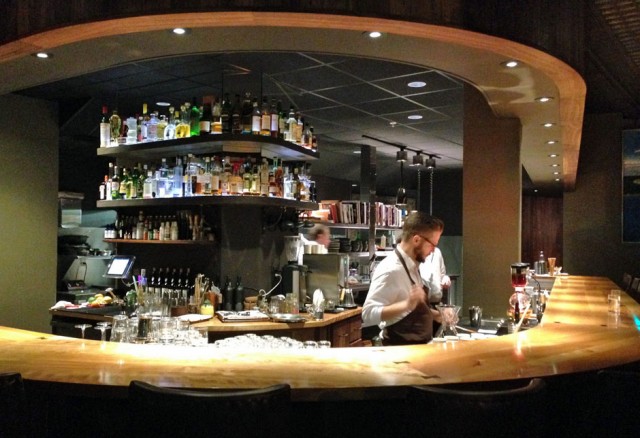
“We give them all the coffee information that we have for every coffee, but we’ve been kind of curating the things we think would be best on siphon and what we think would be best on Chemex. And then they serve our espresso blend on French press all the time,” continued Pratt, who noted that Hugo’s sister restaurant, Eventide, also serves Tandem coffees on French press. (The roaster’s also gotten a foothold in several other local hotspot restaurants, like Pai Men Miyake, whose innovative beer program pairs nicely with Tandem’s more unusually profiled coffees, and Rob Evans’ post-Hugo success at Duckfat, who prepare Tandem coffees to-order exclusively on Clever Drippers)
While the rest of the country waits for fine (and even casual, quality) dining to follow in Portland’s footsteps, we at Sprudge urge you to run—well maybe run carefully, it can get icy up there—to Portland, where memorable, thought out, and carefully chosen coffees are being served in delicious harmony with some of the country’s best food.
Liz Clayton is the author of “Nice Coffee Time“, a regular columnist for Serious Eats: Drinks, and New York City chief at Sprudge.com. She lives in Brooklyn. Read more Liz Clayton here.




